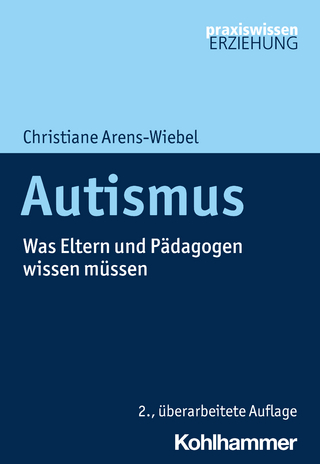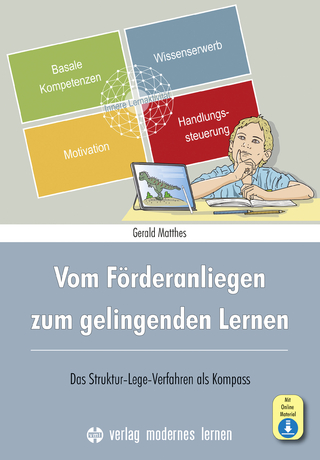
Traditional and Innovative Assessment Techniques for Students with Disabilities
Emerald Publishing Limited (Verlag)
978-1-83909-891-8 (ISBN)
In order to properly understand and compare traditional and innovative assessment techniques for students with disabilities, we must be able to access examples of how they work in a logical and thoughtful sequence. This finely curated collection of thirteen chapters presents ideas and research on different disability topics from key leaders in the field of the assessment of children with disabilities.
Written by well-known and respected researchers, scholars, and educators who are actively involved in teaching undergraduate and graduate special education courses on the assessment of students with disabilities, this volume opens with a thorough introduction on the current situation. The topics covered by the remaining chapters include students with learning and intellectual disabilities, emotional and behavioral disorders, sensory impairments, extensive support needs, traumatic brain injuries, and those who are culturally and linguistically diverse, autistic, and those who have physical disabilities. The concluding chapter muses on what the future holds for traditional and innovative assessment techniques for students with disabilities. This volume is an excellent resource for special education researchers, scholars, practitioners, and professionals who teach and serve young learners with disabilities.
Festus E. Obiakor is the Chief Executive Manager, Sunny Educational Consulting, Shorewood, Wisconsin. He is teacher, scholar, leader, and consultant who has served as Distinguished Visiting Professor at a variety of universities. Jeffrey P. Bakken is Professor and Associate Provost for Research and Dean of the Graduate School at Bradley University. He has published 200 works that include books, chapters, journal articles, and proceedings at international conferences.
Chapter 1. Traditional and Innovative Assessment Techniques for Students with Disabilities: An Introduction; Jeffrey P. Bakken and Erik A. Dalmasso
Chapter 2. Traditional and Innovative Assessment Techniques for Students with Learning Disabilities; Kristen D. Beach and Samantha A. Gesel
Chapter 3. Assessment of EBD; Frederick J. Brigham, John William McKenna, Christopher M. Claude, and Michele M. Brigham
Chapter 4. Traditional and Innovative Assessment Techniques for Students with Intellectual Disabilities; Emily C. Bouck and Holly Long
Chapter 5. Traditional and Innovative Assessment Techniques for Students who are Deaf /Hard of Hearing; Julie Cox and Angi Martin
Chapter 6. Traditional and Innovative Assessment Techniques for Students with Visual Impairments; Stacy M. Kelly
Chapter 7. Traditional and Innovative Assessment Techniques for Students with Autism; Shannon Stuart and Tia Schultz
Chapter 8. Traditional and Innovative Assessment Techniques for Students with Extensive Support Needs; Jennifer A. Kurth, Michael L. Wehmeyer, Carly A. Roberts, and Elissa Lockman Turner
Chapter 9. Assessment of Students with Traumatic Brain Injuries; Frederick J. Brigham, Stacie Harmer, and Michele M. Brigham
Chapter 10. Dynamic Assessment of Speech and Language Disorders: Examples for an Educational Setting; Ginger G. Collins and Amy M. Glaspey
Chapter 11. Traditional and Innovative Assessment Techniques for Students with Physical Disabilities and Other Health Impairments; Eugene F. Asola and Samuel R. Hodge
Chapter 12. Traditional and Innovative Assessment Techniques for Students from Culturally and Linguistically Diverse Backgrounds: Problematic Histories and Transformative Futures; Kathleen A. King Thorius
Chapter 13. Traditional and Innovative Assessment Techniques for Students with Disabilities: Moving Forward; Sunday Obi, Festus E. Obiakor, and Andrew T. Carrington
| Erscheinungsdatum | 19.07.2021 |
|---|---|
| Reihe/Serie | Advances in Special Education |
| Verlagsort | Bingley |
| Sprache | englisch |
| Maße | 152 x 229 mm |
| Gewicht | 499 g |
| Themenwelt | Sozialwissenschaften ► Pädagogik ► Sonder-, Heil- und Förderpädagogik |
| ISBN-10 | 1-83909-891-0 / 1839098910 |
| ISBN-13 | 978-1-83909-891-8 / 9781839098918 |
| Zustand | Neuware |
| Haben Sie eine Frage zum Produkt? |
aus dem Bereich


